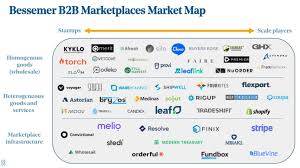B2B e-commerce is not just a trend; it’s a revolution. By 2025, digital transactions will rule the B2B world, with B2B sales volumes touching spreading to hard core traditional industries. Industrial marketplaces are the new matchmakers, connecting buyers and sellers in a digital dance of commerce. We will see corporates launching dedicated marketplaces, and they will be an evolution from just an eStore. We will also see roadmaps where B2B corporates will evolve from being a one-way transaction platform to a customer lifecycle relationship tool. It’s time for Salesforce to re-think its CRM roadmap.
Introduction
• Define the evolution of B2B marketplaces and their impact on business transactions.
• Importance of digital transformation in reshaping B2B commerce.
1. The Rise of B2B Marketplaces
• Overview of traditional B2B transactions vs. digital marketplaces:
• Shift from offline to online procurement and sales.
• Benefits of centralized platforms for B2B buyers and sellers.
2. Characteristics of B2B Marketplace 2.0
• Advanced Features:
• AI-powered matchmaking algorithms for buyer-seller connections.
• Real-time analytics and data-driven insights for informed decision-making.
• Global Reach:
• Expansion of market reach beyond geographical boundaries.
• Multi-currency and multilingual capabilities to facilitate international trade.
3. Technological Foundations
• Cloud Computing:
• Scalability and flexibility in managing large volumes of transactions.
• Integration with ERP systems and supply chain management solutions.
• Blockchain Technology:
• Role of blockchain in enhancing trust and transparency in B2B transactions.
• Smart contracts for automating contract execution and payment processes.
4. Industry Applications
• Manufacturing and Supply Chain:
• Procurement of raw materials and components.
• Just-in-time inventory management and supply chain optimization.
• Services and Consulting:
• Digital platforms for outsourcing services and project management.
• Expertise marketplaces for consulting and professional services.
5. Benefits of B2B Marketplace 2.0
• Efficiency Gains:
• Streamlined procurement processes and reduced transaction costs.
• Faster time-to-market for products and services.
• Enhanced Customer Experience:
• Personalized recommendations and tailored purchasing experiences.
• 24/7 accessibility and customer support.
6. Challenges and Considerations
• Data Security and Privacy:
• Protection of sensitive business information and customer data.
• Compliance with data protection regulations (e.g., GDPR, CCPA).
• Integration Complexity:
• Challenges in integrating diverse systems and legacy software.
• Training and change management for adopting new digital platforms.
7. Future Trends and Innovations
• AI and Machine Learning:
• Predictive analytics for demand forecasting and inventory management.
• Virtual assistants and chatbots for customer service and support.
• IoT and Connectivity:
• Integration of IoT devices for real-time monitoring of supply chain and logistics.
• Smart sensors for tracking product lifecycle and environmental conditions.
8. Conclusion
• Summary of the transformative impact of B2B Marketplace 2.0 on global commerce.
• Outlook on future trends and opportunities for innovation in digital B2B ecosystems.




No comments yet
Be the first to share your thoughts!